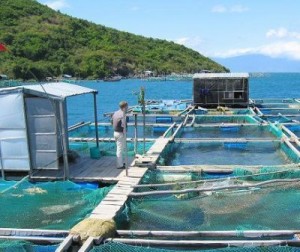FARMING NOTES OCTOBER 2014
Duncan Allison, PSPA president
Aquaculture and seafood supplies in the US – Seafood globally is big business and we know that fish protein is an important and healthy constituent of our diets here and throughout most of the world. We export much of our own quality fish and import 86-88% of the seafood we consume. U.S. aquaculture produces only about 5% of our seafood supply. We are reminded about the fate of Chesapeake Bay oysters and Atlantic cod and overfishing. A professor from China imported 120 New England scallops to China and developed efficient production methods and started exporting them back to us in large quantities. We read of the challenges of aquaculture such as disposing of the “dirty water” after a production cycle but we know that we have discharge legislation that sets rigorous federal and state standards. Disease is also a constant challenge and there are fears that escaped fish might interfere with the natural ecosystem. We have the knowledge and infrastructure to produce safely so why have we not embraced aquaculture more strongly?
Philadelphia Society for Promoting Agriculture (PSPA) members and their guests will have a great opportunity to learn much more about this important aspect of modern farming. Join the PSPA trip on November 6th to Blair View Fish Farms and hear lectures from University of Delaware and Delaware State University staff on the prospects for aquaculture and their exciting current research and development work. Go to pspaonline.com for more details.
Arguments for livestock production – There is increasing pressure for us to reduce meat consumption for our own best health interest and for the good of the planet. Beef probably gets the worst rap due to methane production and to the lower feed conversion rate. Counter arguments include the huge population of bison that were roaming the prairies, greatly outnumbering our current livestock total. Livestock also uses land that should not be used for any other purpose except carefully managed grazing. Cattle are able to convert indigestible grass and other organic material to a high quality source of protein and energy. Livestock also consume much of the waste from the crops grown for our food such as wheat bran, orange pulp, distillers grains after ethanol production including the proteins, minerals, fat and fiber, vegetable and fruit waste.
Our corn yields have been increasing significantly so that we are producing more from the same acreage – record this past year of 174 bushels/acre. Soybeans are another great example as we need the oil for our cooking and other uses but the remaining meal is high in protein so provides the basis for livestock and pet food. We are reducing our meat consumption quite significantly but developing countries are requiring more meat and dairy products as their economies improve. How can we explain the complicated interactive matrix of uses of our land and food production for us and for livestock, horses and pets? How do we make the case for maintaining livestock production? Please comment.
Need for the Facts – There is general agreement that farming needs to do a better job of providing the facts. Farming is still families, it is high risk being so dependent on weather and dramatically changing prices, scale is important like in other businesses, soil conservation is vital as we learn how this can be best achieved, farming is high tech and requires highly trained people at all levels etc. The National Association of Farm Broadcasting issued a recent Agri Marketers poll which indicated that 6% felt that there had been Positive Progress in consumer education, 72% Some Progress and 22% No Progress. Clearly we have a long way to go!
Good signals about youth and farming – Membership of the National FFA Organization is at its highest level – 610,240 students up from 579,678 in 2013. There are more FFA chapters – now 7,665. Delaware FFA membership is up to >4,200 members in New Castle, Kent and Sussex counties, New Jersey has more than 2,600 members and Pennsylvania membership increased in 2014 by 4,494 members to reach 12,688 members. This superb program not only provides courses in a whole range of farming subjects but also on topics such as public speaking, knowledge of the legislature and many other critical life skills.
General Mills shareholders rejected a resolution to force removal of GMO products from the company’s products. The General Mills CEO stated that research has shown that GMOs are safe. The fact-based scientific consensus can trump emotional appeals not based on science or reason. 10/23/2014

